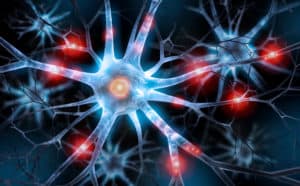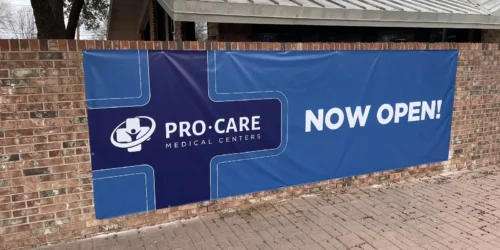
Here are three of the most common neurological pain syndromes.
Diabetic Neuropathy
Diabetic neuropathy is one of the more well-known types of neurological pain syndromes and it can affect anyone who has diabetes due to high blood sugar. When you have high blood sugar it can actually damage your nerves over time, especially in the legs and feet. Diabetic neuropathy is a serious complication of diabetes and can cause mild to severe symptoms depending on the level of damage to the nerves. Those who struggle with diabetic neuropathy tend to experience numbness and limited ability to recognize pain and temperature changes in their legs and feet.
Shingles Complications
Shingles is a viral infection that affects nerve roots, but it is most commonly known for rash and blisters that develop on the trunk of the body in those who have previously had chickenpox. One of the most common shingles complications is called postherpetic neuralgia, which is a condition that affects your nerves. If you develop postherpetic neuralgia, it can cause a burning pain that continues long after the shingles rash has disappeared. If left untreated, this can develop into permanent nerve pain and damage.
Pinched Nerves
Radiculopathy refers to symptoms that develop due to a pinched nerve. If left untreated, a pinched nerve can lead to lingering headache after an injury or even chronic neurological pain. It is possible to have a pinched nerve anywhere along the spine, referred to as the cervical, thoracic, and lumbar areas. The symptoms may differ depending on the person and location of the pinched nerve, but common symptoms include sharp, stabbing pain, weakness, tingling, and numbness.
Causes and Symptoms of Neurological Pain Syndromes
There are a number of disorders that can lead to neurological pain syndromes, including diabetes, shingles, and pinched nerves. Central nervous system disorders like Parkinson’s disease and multiple sclerosis can also cause neurological pain syndromes. Additionally, there are multiple examples of spinal nerve injuries that have led to compression and inflammation. With any of these disorders or injuries, if left untreated it can develop into chronic nerve pain that can significantly impact your daily activities and abilities.
While initial nerve damage or injury can start to affect nerve functioning, it can begin to affect nearby nerves and develop into chronic pain. There are three main types of chronic neurological pain, including spontaneous pain, evoked pain, and hypoalgesia. Spontaneous pain refers to any type of pain that doesn’t require anything to trigger the pain. These pain symptoms can be mild like tingling and numbness or more severe like stabbing, shooting, or burning pain. Evoked pain refers to pain after you come into contact with something that wouldn’t normally cause pain, like the bedsheets brushing against your feet. Hypoalgesia refers to a loss of pain symptoms over time when you touch something that would normally cause pain, like touching a hot stove.
Treatment for Neurological Pain Syndromes
ProCare Medical Centers offer neurology in San Antonio to provide quality treatment and comprehensive care to anyone who suffers from neurological pain syndromes. Neurologists specialize in treating nervous system disorders like diabetic neuropathy and radiculopathy. Whether you struggle with chronic or acute pain due to a neurological pain syndrome, you can visit ProCare for neurology in San Antonio to help manage pain and provide relief. Your neurologist will provide you with effective pain management while also addressing the root cause of your nerve pain.
At ProCare Medical Centers, you can receive an in-house referral to neurology in San Antonio or the five other locations including the Greater Austin area. Your neurologist can talk to you about your options, including recommended procedures to try before resorting to a more invasive procedure like surgery. Prescription medications, nerve blocks, and spinal injections may be used to help stop pain signals. To learn more about how neurology in San Antonio and how your neurologist can help you experience lasting relief from neurological pain syndromes, call or book online to visit ProCare Medical Center.



